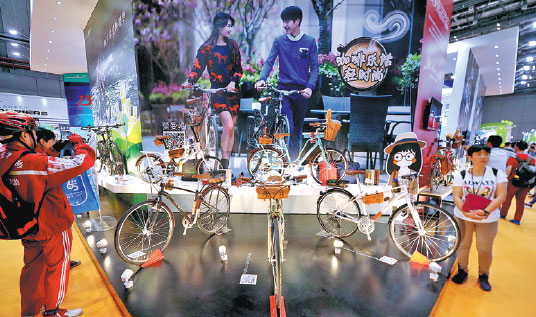For bicycle sellers, future appears to be a mixed bag
By Wu Yong in Shenyang and Zhang Min in Tianjin (China Daily) Updated: 2017-03-27 06:46In the cold early spring of Northeast China, Wang Chao, a bicycle retailer, clothed in no more than a single-layer blue garment, was sweating profusely, busy assembling new bikes and serving customers. No time for even a coffee.
Wang stocks the products of Giant, a leading bicycle producer, at his 240-square-meter store in Shenyang, a metropolis of 8 million denizens. Last year, he sold more than 600 sports bicycles.
But thousands of other bike retailers appear to be struggling to survive in the fast-changing market. The change has been brought about by the mushrooming bicycle-sharing service providers.
Not so long ago, some people wondered if the bicycle, hitherto the main means of transport for many people, would disappear from the streets of China, the Bicycle Kingdom, due to the relentless march of the automobile.
Wang was not one of them. "Bicycle sharing is not a big threat but a big chance for us (retailers). It helps attract more health-minded people to cycling. And they are our target consumers."
Wang's main revenue comes from exercising products. Such bicycles are totally different from the ones used by bike-sharing service providers.
"What we provide is a perfect exercising experience and social network (as fitness-minded people ride together often)," said Wang. The average weight of his products is about 12 kilograms, same as a chubby corgi.
Agreed Zhang Ning, a student from Tianjin. "I ride both ofo bikes and sport bicycles. But they are totally different. The first one is convenient. But, riding a bicycle, I want to reach my destination as soon as possible. In this context, riding my sports bicycle is an amazing and relaxing experience."
With China's entry into the middle-income countries in 2015, the consumption of health products continued to grow rapidly. Officials from the National Development and Reform Commission expect that the outdoor sports market may reach 900 billion yuan in 2020 on the back of double-digit annual growth.
Giant could not be reached to comment. But a source close to Giant said the company has a strategy to tap the opportunity presented by bicycle-sharing business. It apparently intends to focus on sports and racing bicycles and scale down production of lower-end products.
Unlike Wang, most shop owners engaged in selling commuter bicycles say their business is getting worse.
One shop owner said he could sell only two bicycles last month, which nearly drove him to shutter his business. "A decent bycle costs around 500 yuan. I can hardly make both ends meet (by selling just two bicycles per month). But consumers still complain it's too expensive."
China's bicycle population reached 670 million in late 1990, but the past decade saw a surge in car sales as consumers with lifestyle aspirations chased products in higher niches.
A retired sales manager from Feige (which means flying dove), one of the top three bicycle brands in China, said the golden era of commuter bicycles has passed already. Many bicycle plants have no research departments and only work as assembly lines.
"This is a vicious cycle. They did not invest for the future and now they are losing the future. The bicycle sharing trend is just the last straw," said Li Kai, a professor at the School of Economics and Management, Dongbei University.
Zou Yumeng contributed to the story
Contact the writer at wuyong@chinadaily.com.cn@chinadaily.com.cn
|
The booth of Giant at the 25th China International Bicycles Expo in Shanghai. Ma Yan / Xinhua |
- 'Cooperation is complementary'
- Worldwide manhunt nets 50th fugitive
- China-Japan meet seeks cooperation
- Agency ensuring natural gas supply
- Global manhunt sees China catch its 50th fugitive
- Call for 'Red Boat Spirit' a noble goal, official says
- China 'open to world' of foreign talent
- Free trade studies agreed on as Li meets with Canadian PM Trudeau
- Emojis on austerity rules from top anti-graft authority go viral
- Xi: All aboard internet express












